Kshama Rao in Mumbai
Shah Rukh Khan's ambitious dream, RA.One will release on October 26 but he began its promotions in January itself -- 10 months before the release!
Aamir Khan pulled out all stops to hammer Delhi Belly into the viewers' minds. Exactly a week before its release, Khan called for an 'important announcement' which was nothing but yet another song unleashed on the media.
The song, however, was an 'item number' and Khan wanted the media to have a first look at his 'Elvis Presley meets Mithunda' gig before plugging the same to the aam junta. This, after a steady stream of star interviews, 'first looks', first theatrical trailers, first song and so on.
Amitabh Bachchan went full throttle, promoting his last outing Bbuddah Hoga Terra Baap. He had Delhi Belly and Transformers 3 to contend with.
If Hrithik Roshan, Abhay Deol, Farhan Akhtar and Katrina Kaif went on a road trip from Mumbai to Delhi to wax eloquent about Zindagi Na Milegi Dobara, friends Ajay Devgn and Rohit Shetty are giving the mandatory interviews to plug Singham, due to release on July 22.
Point of the matter: films today are released bit by bit, in installments, firing on all cylinders just before it goes out into the market on that fateful Friday.
Ten years ago, film promotion meant a glittering music launch, about two months before the launch date followed by mandatory star, director and even producer interviews.
Today, the ubiquitous PR and marketing arm of every production house ensures that the hype begins at least four months before the release. Promos are out, then a theatrical promo, and then some 10 songs are let out prompting a seasoned journalist to say, 'Oh no, not another press conference for a song!'
We spoke to a few trade analysts and members of the industry about this growing trend of bombarding the movies, whether it runs the risk of overkill for the viewer, the budgets for promotions and the all-important first weekend of the release. Here's what they have to say:
Rohit Shetty, Director
Well, the scene has changed drastically. If there was one theatre in Andheri, Chandan, the next one was in Bandra. But today within a radius of 1 km, you have at least four theatres and about 20 shows a day in a multiplex compared to three in single screen theatres many years back.
People ask us why films don't run for 25 weeks and why don't we have silver and golden jubilees, that's exactly because today the film is a hit or a flop within the first three days.
One has to take into account the ever-looming media too, things are constantly evolving and so are the promotional strategies.
For Singham, we are only doing the mandatory star-director interviews and we will visit a few cities. This film doesn't really call for anything more innovative. But marketing is an absolute necessity and you can't do away with it.
'The PR these days is always in overdrive'
Image: A still from Delhi BellyTaran Adarsh, trade analyst and film critic:
Marketing and promotion has taken over the films in a big way. There is the first promo, then the theatrical trailer, every song is publicized apart from the star interviews in every paper and channel, and stars visiting cities and having premieres in foreign countries. In fact, now it's a clause in most agreements with stars that they have to devote at least two months to the promotion of the film.
Hollywood spends big bucks on their films and the same has started here. Makers keep aside a substantial budget, about 20 to 30 per cent of the film's total budget just for the PR and don't think twice before going all out, reaching out to the viewer as much as possible.
The idea is to attract attention. Yes, the PR these days is always in overdrive and there could be overkill but with the viewers' low attention span. You have to get that viewer with constant bombardment of your film.
Gone are the days when films ran for several weeks and celebrated silver and golden jubilees, film PR has gone beyond film posters. Today, pirated DVDs are out even before the film's release, and they kill the film's prospects. So what does a producer do? He releases the film in A, B, C centres at the same time unlike earlier when it used to be released within short gaps.
The initial buzz has to be strong because there are many films vying for the audience' attention. What do you do when Delhi Belly, Bbuddah Hoga Terra Baap and Transformers are releasing on the same day? It had started with SRK's Don when he went all out because Jaaneman was releasing in the same week.
Then of course, there is Aamir (Khan) who has taken marketing to another level and the other stars who are catching up and realising the importance of marketing.
'Unless you go to the viewer, they won't come to you'
Image: A still from DonVajir Singh, editor, Box Office India:
I think this trend of heavy promotions and first looks started with Krissh and Don but you can't really single out a film. There are huge investments involved. So apart from being a creative process, it includes a great deal of marketing and strategy.
Filmmaking is a very risky business and makers are opening the cards one by one to keep the buzz alive.
Earlier, it was more content driven, a small group of people would be involved with creative decisions and that's it. Today, there is a separate team to look after the promotions and marketing. It's nothing but catching eyeballs to increase the footfalls in the cinema halls.
Filmmakers have realised you have to generate curiosity before your film hits the theatres. Yes, it runs the risk of overkill for the viewer, it backfires sometimes but it has to be done and you have no option but to blow your trumpet till the film releases!
Unless you go to the viewer, they won't come to you. No wonder then, media-shy actors like Ajay Devgn, Salman Khan and Sunny Deol are warming up to the media.
Most movies are released with maximum number of prints and in a good number of theatres for instant recovery. The idea is to keep the buzz around their films alive which also help them in getting good returns from satellite rights.
SRK is releasing RA.One in October but the publicity started in January itself. It's a different movie from all his earlier films so he's going all out, he needs to inject little doses of his film in the audience at regular intervals and then two months before the release he will go all out. Promotions are a necessary evil in today's competitive times.
'It would take 25 to 30 weeks before we knew if a film was successful or not'
Image: A still from Bbuddah Hoga Tera BaapAmitabh Bachchan, Actor and Producer:
If films are being releasing bit by bit in today's times, it's because of the increase in the medium of communication. In earlier days, we didn't have these kind of tools available. So a film release meant putting out an ad in Screen (a trade paper) and putting up hand-painted film posters.
Earlier, it would take 25 to 30 weeks before we knew if a film was successful or not. Today, in a matter of six hours, the verdict is out and you know if it's a hit or a flop.
Today, a lot of money rides on these films and people are keen to recover that money as soon as possible. If it happens in the very first week, then you are through. And with all due respect to the films that are made today, no one really remembers them for more than a week or two.
There is so much available to the viewers like television shows, cinema, internet, radio, ek khatam hua toh doosra aa jaata hai. The rapidity with which these tools of communication are increasing, it's changing the way we think.
'The idea is to find the soul of your film and then crack the campaign accordingly'
Image: Movie poster of RA.OnePrabhat Choudhary of Spice, an entertainment PR agency which has worked with the likes of Yash Raj Films, UTV Motion Pictures and Aamir Khan Productions:
We are living in an age of media explosion. Since the past five-six years, the media has become a full-blown phenomenon. And so film marketing and promotion is only catering to the changing, evolving system. Things are changing as we speak. If some people think, it's chaos, it's also making a of sense to those who are into the business of filmmaking.
What you call film promotion happening in bits, I will say filmmakers have to excite the viewers every time we go out. One has to devise new things to hook the viewer and keep their interest alive in the product. Audience and cinema are like lovers. The romance in their relationship needs to be rekindled all the time. Imagination is the key here to keep the spark alive.
I feel most filmmakers are still following the conventional thought processes of promoting their films. Maybe they don't need to do anything more or think out of the box, maybe their films don't demand it and so it's only a few who are pushing the envelope and are remarkably market savvy. The idea is to find the soul of your film and then crack the campaign accordingly.
Marketing is a multi-pronged exercise, there are various players looking after the different aspects of promotions. Big budgets do not necessarily mean great marketing ideas. There is no point in spending crores on marketing a small budget film, thereby not making it a feasible idea. Marketing has to be intelligent.
Today, marketing is mainly aimed at the 12 to 35 age group. It's a young audience out there which has too many options. They are on the go and their attention spans are shrinking by the day. You got to capture that. The viewers today is a different breed and combined with an aggressive media, it's a deadly cocktail. The idea is to fire on the first weekend.'Different films have different strategies'
Image: A still from PaaArchana Sadanand, Proprietor, Imagesmiths, has worked with the likes of Subhash Ghai, Vidhu Vinod Chopra, Farhan Akhtar among others:
Audiences have varied choices now and therefore for them to be able to make those, the producer needs to entice them and prepare them for what is in store for them. This is when the PR and marketing strategist come into the forefront. The planning of how to release the first look, the positioning etc is put into place.
I don't think it's an overkill; it's just that the audience is kept informed at various intervals to look out for the film.
Different films have different strategies. Most recently for Paa, the look of the protagonist Auro was kept so secretive, the first look event created a lot of positive buzz.
In the past, the same was done for Jodhaa Akbar. Budgets vary from anything starting from Rs 5 crores to 20 depending on the cost of the film.

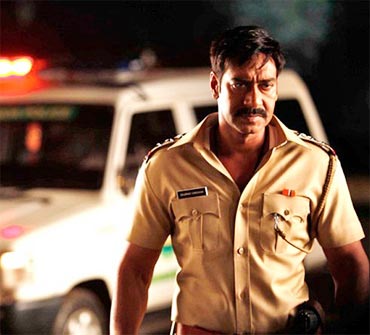
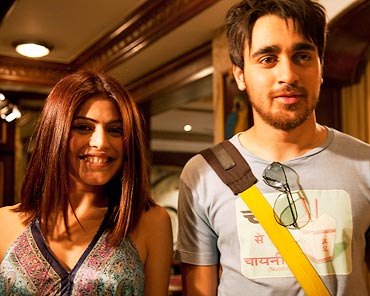
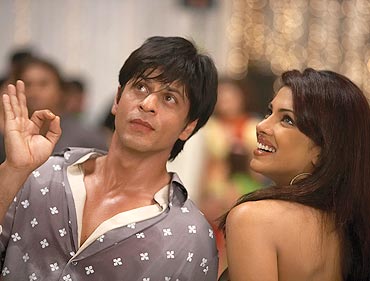
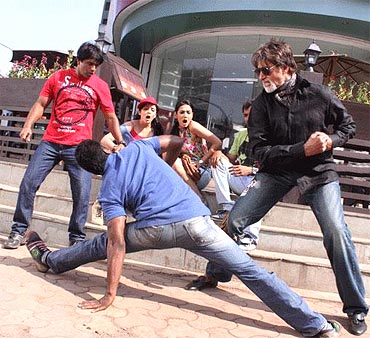
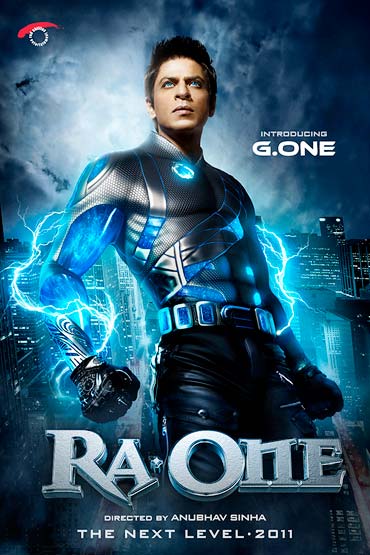
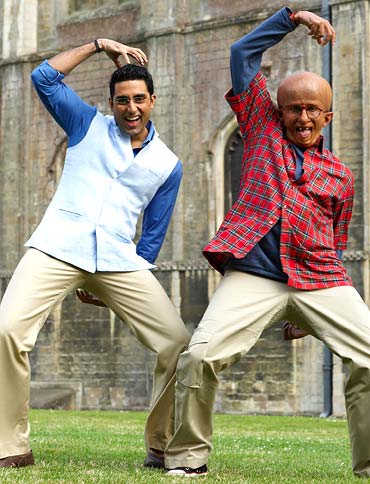
Comment
article